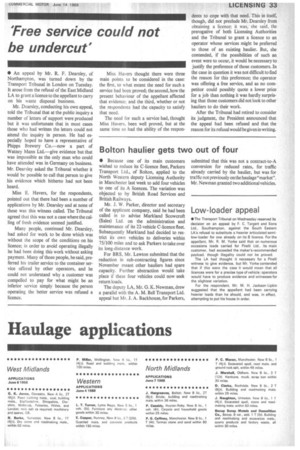'Free service could not be undercut'
Page 35

If you've noticed an error in this article please click here to report it so we can fix it.
• An appeal by Mr. R. F. Dearsley, of Northampton, was turned down by the Transport Tribunal in London on Tuesday. It arose from the refusal of the East Midland LA to grant a licence to the appellant to carry on his waste disposal business.
Mr. Dearsley, conducting his own appeal, told the Tribunal that at the public inquiry a number of letters of support were produced but it was unfortunate that in most cases those who had written the letters could not attend the inquiry in person. He had especially hoped to have a representative of Phipps Brewery Co.—now a part of Watney Mann Ltd.—give evidence but that was impossible as the only man who could have attended was in Germany on business. Mr. Dearsley asked the Tribunal whether it would be possible to call that person to give his evidence which hitherto had not been heard.
Miss E. Havers, for the respondents, pointed out that there had been a number of applications by Mr. Dearsley and at none of these was this witness called. The Tribunal agreed that this was not a case where the calling of fresh evidence seemed justified.
Many people, continued Mr. Dearsley, had asked for work to be done which was without the scope of the conditions on his licence; in order to avoid operating illegally he had been doing this work without asking payment. Many of those people, he said, preferred his trailer service to the container service offered by other operators, and he could not understand why a customer was compelled to pay for what might be an inferior service simply because the person operating the better service was refused a licence. Miss Havers thought there were three main points to be considered in the case: the first, to what extent the need for such a service had been proved; the second, how the present behaviour of the appellant affected that evidence; and the third, whether or not the respondents had the capacity to satisfy that need.
The need for such a service had, thought Miss Havers, been well proved, but at the same time so had the ability of the respon dents to cope with that need. This in itself, though, did not preclude Mr. Dearsley from obtaining a licence; it was. she said. the prerogative of both Licensing Authorities and the Tribunal to grant a licence to an operator whose services might be preferred to those of an existing haulier. But, she contended, if the possibilities of such an event were to occur, it would be necessary to justify the preference of those customers. In the case in question it was not difficult to find the reason for this preference; the operator was offering a free service, and as no competitor could possibly quote a lower price for a job than nothing it was hardly surprising that those customers did not look to other hauliers to do their work.
After the Tribunal had retired to consider its judgment, the President announced that the appeal had been refused and that the reason for its refu sal would be given in writing.




























































































































